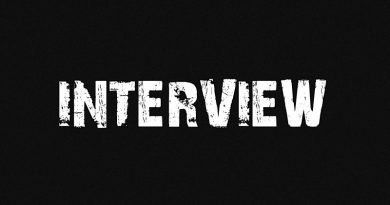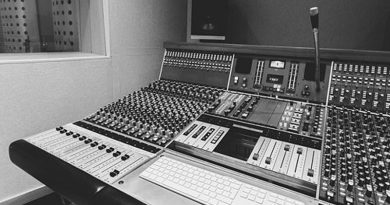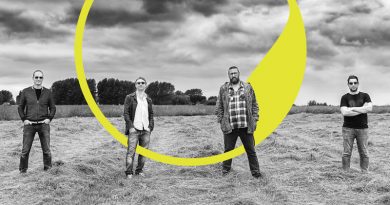In Search Of Tone: Chris Babalis Sr. & Jr. Of Acid Mammoth
Music plays an enormous role in the life of my family. At any given time you can hear my wife’s beautiful voice in the other room accompanied by her elegant piano playing. My two boys turning anything into drums, or playing my guitars, or putting my dad on speaker phone to share ideas on bass and guitar. When I learned Acid Mammoth was a father/son duo, well that really hit home.
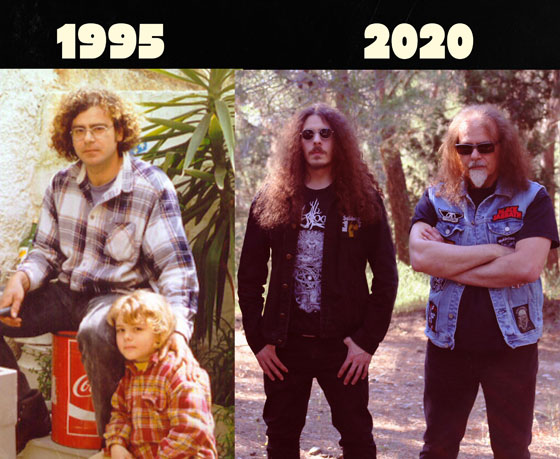
I was fortunate enough to speak with both Chris Babalis Sr. and Chris Babalis Jr. of Acid Mammoth in a unique interview experience, getting multi-generational advice on guitar tone and songwriting. Acid Mammoth have been very busy in 2020 with a split EP with 1782, their second full length Under Acid Hoof and recording Caravan due out March 5th 2021 through Heavy Psych Sounds. I appreciate them setting a little time aside to answer my questions.
Father and son duo on guitar. That’s really awesome. I have two boys and if they start a band when they get older, I hope they ask me to join [haha]. How do you both approach guitar and create tones that complement each other?
Sr: Hey Josh, thanks for this interview! I grew up in Canada and I lived my teenage years through the 70s, which means that most gems of classic rock were on display in the ‘New Releases’ section of record stores. Try to imagine back in the 70s, a 13 year old kid like me at the time, exposed to the Black Sabbath even before discovering Led Zepellin. To be more specific, bringing back home the Sabotage album from the local record shop, spinning it late at night all alone in the dark, and exposing my ears for the first time to those heavy Iommi riffs along with Ozzy’s haunted vocals, is what marked me, and is what created the ideal guitar tone in my head since then.
Jr: Hey Josh, first of all thank you for this interview. I’m sure that when your boys get older you will jam lots of rad tunes together! I love my dad’s guitar work. He still employs this old school aesthetic and style in his playing that has done wonders for our sound. You can try using elements from 70s rock to your guitar playing and do it very successfully, but my dad lived it so it comes off to him naturally. We’ve no need for a virtuoso who plays super-fast solos and complicated bits. We need someone who plays really heartily and has this rad 70s vibe which is really old school and really doom at the same time, and this is why my dad was the right man for the job.
When we started this band with Dimos [Varikos – bass] we didn’t even bother to consider someone else to fill the role. As for myself, I’m not even half the guitarist my dad is. Usually, when we play live, my dad plays the lead riffs and solos while I fill him with rhythm guitar work, playing chords and the main riffs, complementing his sound. Even with the riffs that I’ve written, he’ll just make them sound cooler than I ever will. Being family really connects us as musicians. We know each other’s playing really well and so while playing together we can communicate without saying a word.
You can try using elements from 70s rock to your guitar playing and do it very successfully, but my dad lived it so it comes off to him naturally…
You’ve been very busy in 2020 with a split EP with 1782, Under Acid Hoof and a new album Caravan to be released this year. That’s a lot of music in a short time. How do you create new music without repeating yourself or others?
Jr: Thanks! Indeed, due to COVID and gigs being completely put on ice, we focused on songwriting and recording. For the two months of the first lockdown in Greece I moved back to my dad’s house, so we had time to practice daily the songs of Doom Sessions Vol. 2, which were recorded almost immediately after the first lockdown was lifted. Caravan was recorded pretty much before the second lockdown.
When it comes to not repeating ourselves, we just make sure that every new record is fresh, and that it keeps what was great in the previous one, but takes the band a step forward, in every aspect. Whether it’s the atmosphere, the vibe and aesthetic, or the music itself, we’re always trying to keep the character of the band intact, while at the same time do something slightly different.
Under Acid Hoof was this ultra-heavy, fuzzy mammoth. Doom Sessions Vol. 2 definitely took us to a darker path, as it had a more occult, witchy atmosphere than Under Acid Hoof, which spanned from the riffs themselves to the lyrics, and the drum playing. With Caravan we wanted to go to an even heavier direction, and I strongly believe that we did. I think that the song compositions themselves are more complete, with me and my dad ‘speaking’ to each other throughout the record, with the two guitars communicating and complementing each other. I think this album has more meaningful structures and a much more thought-out guitar work. It wasn’t just plugging in to an amp and playing wicked riffs, we worked together a lot to reach a level of unity in our guitars.
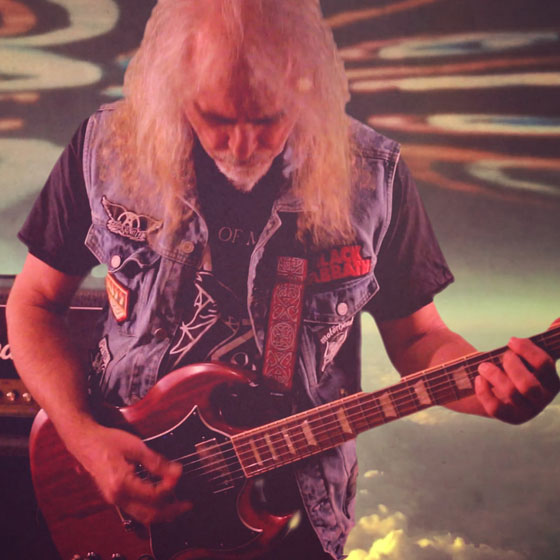
Often I find I play a cool sounding riff only to listen back and hear how terrible it was and get discouraged. I’ll then just continue playing what I already know. What do you do for inspiration if you’re having an off day or to keep from playing the same song or riffs over and over?
Jr: I can really relate to this. We’ve written so many riffs that ended up on the shelf. Especially when it comes to my riffs, I’m a very strict critic of myself as a composer, and therefore if something does not truly speak to me, I just discard it and it doesn’t make it to a record. We’ve never been fans of filler riffs, or filler songs anyway, we want every second of every song to really mean something, thus every riff we write, we want to make sure that it’s awesome and not something that’s there for the sole purpose of filling some space to complete a song.
I don’t have a particular source of inspiration, usually when I start playing guitar, riffs just start coming, and when I feel that I have played something of worth, I keep replaying it, expanding on it, until it can acquire its flesh and bones. As far as inspiration goes, old school horror movies from the 50s, 60s and the 70s have really provided a lot of inspiration. Just their overall vibe is enough for me to get in a particular mood and start playing, and usually the result is really fulfilling.
Sr: When a cool sounding riff comes to me, it’s mostly spontaneously, on the first touch of the fretboard, usually after a few days’ interval in playing and with a fresh mind. After that, continuous playing just wears the feeling out. Now, the real trick in recording the inspiration is how to manage to get the record button on without your brain knowing about it. What I’m trying to say, in my case, is the whole process of record/stop/playback just makes me lose creativity.
When a cool sounding riff comes to me, it’s mostly spontaneously, on the first touch of the fretboard, usually after a few days’ interval in playing and with a fresh mind…
Do each of you have a particular song or riff you’re proud of writing?
Jr: Yes, for me it would be the title track of our new album Caravan. I think it’s the best song I’ve ever written for the band. Of course that’s subjective as it has always been when someone is talking about their own songs, but still, I think it’s the most complete song.
It has many different layers, one on top of the other and yet they flow together smoothly without one overlapping over the other, they coexist and give the song its edge and overall style and aesthetic. It’s very melodic but without losing its heaviness, and it’s really heavy without losing its melodies. It’s given its time to shine, so it’s a really long track at eleven minutes!
Sr: I’m very proud of the guitar solo of Psychedelic Wasteland, also from our new album Caravan. I was just jamming, and junior was recording without me knowing. When we listened to it later we loved the result and it fit the song like a glove.
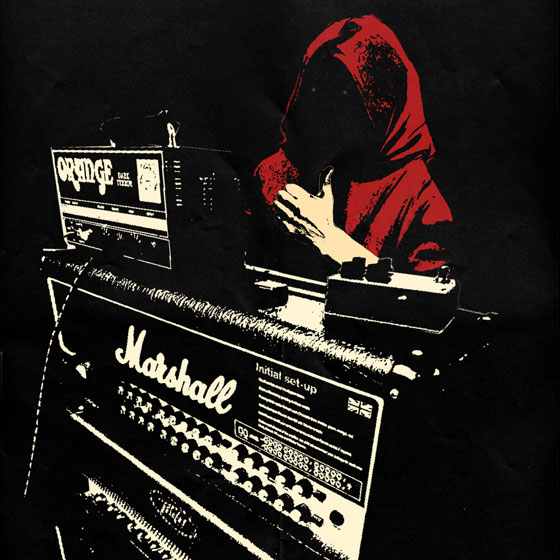
Moving on to gear. What kind of amps are you guys using? Do they differ from recording to live?
Jr: On all of our albums we’ve used two Orange Dark Terrors, as well as a Marshall JVM. When it comes to gigs, until now we’ve both played with our Dark Terrors. They’re not big, but they make out for it with their amazing tone, which complements our riffs so much, it makes up for its lack of size. We’re planning to upgrade in the future and go bigger, when the situation is back to normal and gigs are back on.
Sr: Furthermore, the Dark Terror being a lunch-box size amp is a perfect all-rounder for us. Having portability for a quick grab-and-run to rehearsals, and at the same time making no compromises in high gain quality, it has stood its ground at gigs and has not let us down so far.
When dialling in a tone on your amp, do you start with a clean tone or add a little distortion from the amps before the pedals?
Sr: Well personally speaking for a guy my age, I’m lazy and just go solely with the amp’s gain and distortion, but when I use my pedal board I usually feed a little gain from the amp to the beginning of the pedal chain.
Our pedal board setup is quite straightforward, nothing flashy or fancy. For our main ‘fuzzies’ we use the Big Muff series. For distortion, when not using my amp’s gain, I sometimes use the Sabbra Cadabra pedal…
It seems the pedal board is an ever changing tool. Which pedals have made it to each of your pedal boards and are any of them custom made?
Sr: Our pedal board setup is quite straightforward, nothing flashy or fancy. For our main ‘fuzzies’ we use the Big Muff series. For distortion, when not using my amp’s gain, I sometimes use the Sabbra Cadabra pedal, which sparked my attention last year. And for modulation we use Dunlop Cry-Babies, and a few TC Electronic reverb/chorus pedals either at the end of the chain, or through the effects loop of our amps. And on top of that, I mostly rely on picking and bending for my sound.
Jr: I’m more simplistic than my father when it comes to pedals. I usually play with just my fuzz, my reverb, a delay and my tuner. When I play Marshall, I usually play with a Big Muff or Pharaoh Fuzz. When I play Dark Terror, I usually let the amp speak for itself without any extra distortion or fuzz.
Last but not least are the guitars. What are you both using and do you have a preference in single coil, Humbucker, P90 or active pickups?
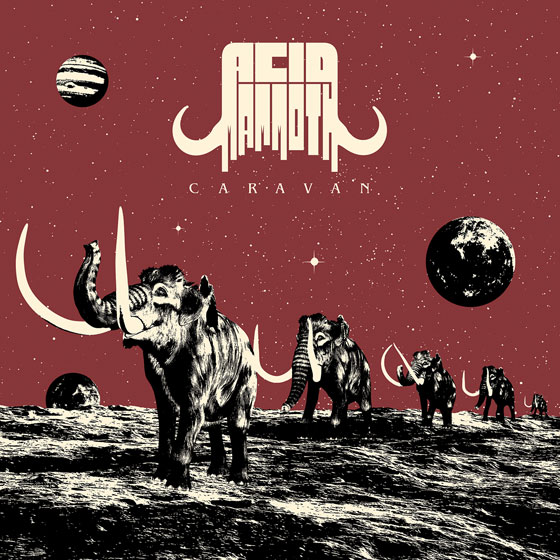
Sr: My guitar is a 1996 Gibson SG standard with the 490R/498T pair humbuckers. My son uses the more modern Gibson Gothic Morte with the active GEM humbuckers. They work really well together.
Do you guys have a guitar, amp or pedal that you have had for a long time and will never part with?
Jr: First of all, dad’s guitar. He has had his Gibson SG for a very long time, and he would never part with it. I got my Gibson Gothic Morte some twenty years later and I really love it, but it’s dad’s Gibson SG that has been in the family since I was a child, so it has an emotional value that cannot be replaced by any ‘newer’ guitar.
It may sound funny, but our two Orange Dark Terrors proved to be something that we couldn’t part with…
It may sound funny, but our two Orange Dark Terrors proved to be something that we couldn’t part with. For our third album we tried going much bigger in an attempt to have a bigger sound. We recorded everything with a Sovtek and a Marshall, but the result wasn’t fulfilling enough. Something was missing, and believe it or not, Orange Dark Terror filled that gap, despite it being much smaller than these two mammoths.
We still used Marshalls on our releases for some of guitars, but the Orange Dark Terror is a really vital part of the Acid Mammoth sound. We are definitely going to try something new in the near future, but what we seek will most probably be in the realm of Orange amps.
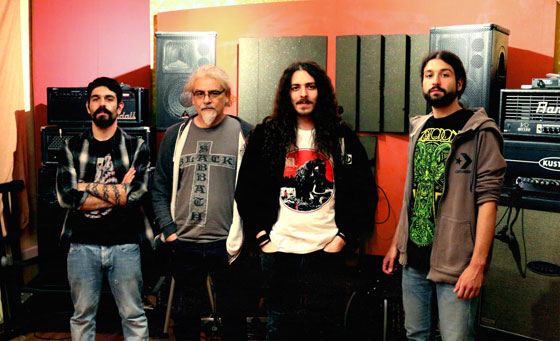
Do either of you have any practice routines or warm-ups that you do on a daily basis?
Jr: Personally I don’t have a practice routine or warm-up in particular. I usually plug in, and start playing my thing until I’m well warmed-up to start the real playing, so no routine in particular, just random doomy riffs. As a band however, the opening song of our debut album White Hag has always been the warm up song during rehearsals for the four of us. We’ve always played it at the start of each rehearsal, as it’s quite an easy and uncomplicated song, thus it’s a great opener for every rehearsal or jam.
Sr: The same goes for me. I stopped practising a long time ago. I just strap on my guitar, turn on the amp, and then leave my heart to do the rest.
We’re really proud of our new album Caravan and we hope you’ll enjoy it…
Thank you both for taking time out of your busy schedule to answer my questions. I really appreciate it. I look forward to Caravan and thanks for putting out some awesomely heavy music last year. Is there anything else you would like to add?
Jr: Thank you so much for this interview! We’re really proud of our new album Caravan and we hope you’ll enjoy it! We hope we see you when we’re able to play shows again, hopefully soon! Until then, cheers, stay safe and all the best!
Sr: Thanks for the interview Josh, cheers!
Acid Mammoth are currently supporting their second album Under Acid Hoof, as well as their recent split, Doom Sessions Vol. 2 with 1782, while their latest album, Caravan, drops on the 5th March and will once again be released by Heavy Psych Sounds.
Label: Heavy Psych Sounds
Band Links: Official | Facebook | Bandcamp | Instagram
Interviewed by: Josh Schneider

